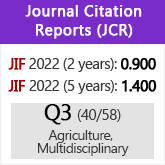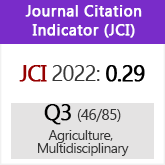In vitro antibacterial effect of exotic plants essential oils on the honeybee pathogen Paenibacillus larvae, causal agent of American foulbrood
Abstract
Chemical composition and antimicrobial activity of exotic plants essential oils to potentially control Paenibacillus larvae, the causal agent of American foulbrood disease (AFB) were determined. AFB represents one of the main plagues that affect the colonies of honeybees Apis mellifera L. with high negative impact on beekeepers worldwide. Essential oils tested were niaouli (Melaleuca viridiflora) and tea tree (Melaleuca alternifolia) from Myrtaceae, and citronella grass (Cymbopogon nardus) and palmarosa (Cymbopogon martinii) from Gramineae. The components of the essential oils were identified by SPME-GC/MS analysis. The antimicrobial activity of the oils against P. larvae was determined by the broth microdilution method. In vitro assays of M. viridiflora and C. nardus oils showed the inhibition of the bacterial strains at the lowest concentrations tested, with minimal inhibitory concentration (MIC) mean value about 320 mg L–1 for both oils, respectively. This property could be attributed to the kind and percentage of the components of the oils. Terpinen-4-ol (29.09%), a-pinene (21.63%) and limonene (17.4%) were predominant in M. viridiflora, while limonene (24.74%), citronelal (24.61%) and geraniol (15.79%) were the bulk of C. nardus. The use of these essential oils contributes to the screening of alternative natural compounds to control AFB in the apiaries; toxicological risks and other undesirable effects would be avoided as resistance factors, developed by the indiscriminate use of antibiotics.Downloads
© CSIC. Manuscripts published in both the printed and online versions of this Journal are the property of Consejo Superior de Investigaciones Científicas, and quoting this source is a requirement for any partial or full reproduction.
All contents of this electronic edition, except where otherwise noted, are distributed under a “Creative Commons Attribution 4.0 International” (CC BY 4.0) License. You may read here the basic information and the legal text of the license. The indication of the CC BY 4.0 License must be expressly stated in this way when necessary.
Self-archiving in repositories, personal webpages or similar, of any version other than the published by the Editor, is not allowed.















